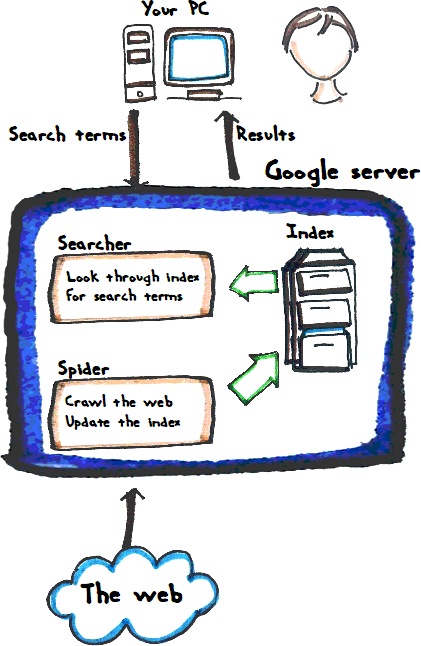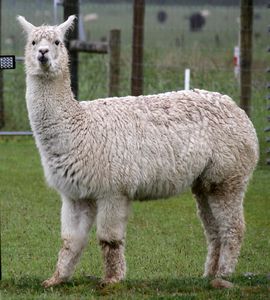Reminder: how Google works
Here's that drawing:

The spider downloads your pages, and analyzes them, working out what searches each page would be a good result for. If your page was about the Beer Hall Putsch, then it wouldn't be useful to someone doing a search for "best dog treats." But it might be useful for someone searching on "rise of fascism."
Content SEO is helping the spider know what searches each page would be good for.
The spider should find your page if there's a link to it, either on your site, or someone else's. That means there has to be at least one external link to your site, then links within your site.
The big question
You want the spider to list your page so that it shows up in searches. So, the big question for content SEO is:
What content should you put on each page, so it shows up in searches?
Actually, that's not quite right. We need to sharpen the question a bit:
What content should you put on each page, so it shows up in searches for particular keywords?
Say you sell healthy treats for dogs and llamas on your site.

Best day ever!
You have a page for healthy dog treats, and another for healthy llama treats. You don't care whether your pages show up in searches like "best fps pc games." You want your pages to show up in searches like:
- best healthy llama treats
- good healthy dog treat
- organic treat for llama
- llama training
Your products are relevant for those searches. If someone searches for "best healthy llama treats," they're a potential customer.

I'm an alpaca, but I like treats, too.
Before you make a page, you should decide what searches you want the page to rank for. So, you need to do...
Keyword research
First thing:
Know what your business/site is about.
You should be able to say why people should do business with you. "We do cool car stuff" isn't good. "We make healthy dog treats" is better. Better still: "Our healthy dog treats won't make your doggo friend put on weight. They're great for training, or just making your friend happy."
Phrases rather than individual words are easier to optimize for. The more precise the term, the better. So, it's easier to optimize for "healthy llama treats" than "lama treats."
Let's take the dog treat page. You can see how many Google searches there have been for different keywords, at https://trends.google.com.
For example, here's a comparison of two search terms:

There were many more searches for "best dog treat" than for "healthy dog treat." About four times as many.

Adela
OK, so optimize for "best dog treat."

Ray
Wait, we talked about this in my marketing course. It depends. There could be a lot of competition for dog treats in general, but less for healthy dog treats. And the healthy treats might be more profitable.
That's right. You might be better off getting 5% of the healthy treat market, than 1% of the dog treat market.
This is why knowing your business focus is so important. Your website is just one facet of your business. It needs to match everything else you are doing.
Use your audience's language
Many companies use specialized language for things. Universities do that a lot. "Course," "section," and "class" all mean specific things to us. We shouldn't expect outside people to know how we use those words.
There are international differences, too. "Course" means something different in US and UK universities.
In your company, maybe "treats" are called "positive edibles," or something strange. Don't optimize for the phrase "healthy canine positive edibles." Makes no sense, outside your company. Use your audience's language.
Exercise
Keyword research in Google Trends
Use Google Trends to compare two key phrases relevant to your final project. For example, "best dog treat" vs "best dog toy," or "Taylor Swift" vs "Nicki Minaj."
Submit a screen shot comparing number of searches over time.
You have some keywords—now what?
There's much more to keyword research, but let's stop here. You can use our Googly friend to learn more.
Once you've chosen some keywords, then what? That's the next lesson.